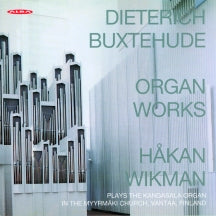Description
Release Date: 01/01/97
Buxtehude's works comprise a significant pan of the repeltoire of today's organists and his music no longer falls in the
Buxtehude's works comprise a significant pan of the repeltoire of today's organists and his music no longer falls in the shadow of the great Bach, but rather has now gained the recognition that a great composer's music is due. Through research we continually get a clearer picture of Buxtehude as aperson, a picture which is enhanced by the stylistic variations in Ius music. We know very little of his childhood, but of his duties in Lubeck we know considerably more. He functioned as the church's treasurer, he wrote poetry, he arranged the famous concen series Abendmusik, he was very hospitable and he had a good knowledge of languages. Besides his two mother tongues German and Danish he knew Latin, Greek, French, Italian and Swedish. In a very natural way Buxtehude took his place in the society of Lubeck since we know that he was ranked as the most respected musician in the city and thereby had good contacts with leading politicians and with representatives of business life. On the other hand he belonged to the so-called foulth class and the fawning plu'ases in his letters indicate that he Imew his place well. Buxtehude's organ works build upon the improvisational style of 17th centulY Germany. In spite of this suprisingly many of his compostions have been written down. Buxtehude's 26 preludes with fugues can possibly be described as fantasies arising from the fugues. His chorales are 47 in number while 12 carlZona compostions have been preserved. One can assume that all of these works were composed for the organ though there is no indication of tills in the source material.
| Label: Alba Records |
| Genre: Classical |
| Run Time: 60 mins |

